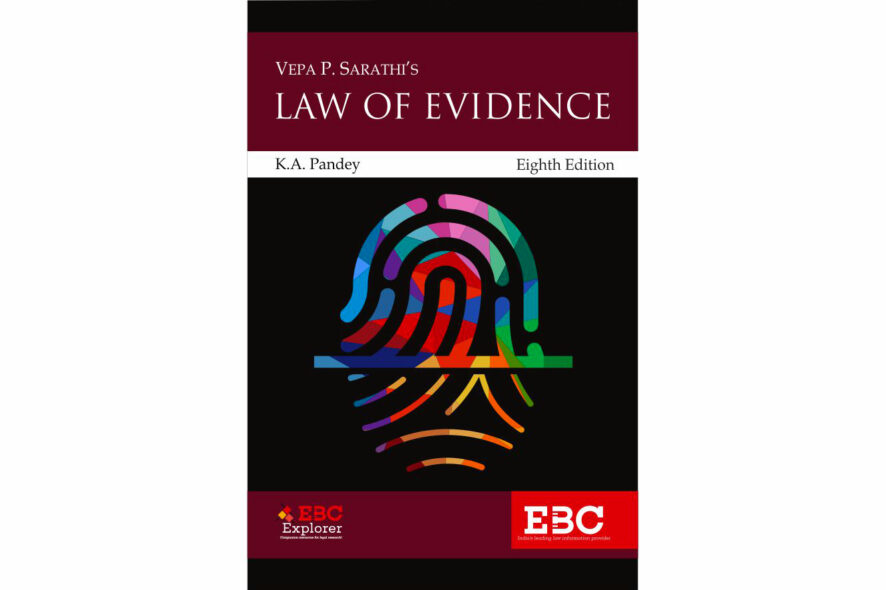V. P. Sarathi’s Law of Evidence || Edition: 8th, 2021
Overview:
Vepa P. Sarathi’s Law of Evidence is a classic work on the subject that clarifies and explains the complicated rules governing the law of evidence in a straightforward and easily comprehensible style. While maintaining the flair of this admired work, the revising author has updated the current edition of the book with the latest case law and statutory changes which have taken place since the last edition.
The following are the unique features of the book:
- Latest case laws, including the case of Mukesh Singh v. State (NCT of Delhi), (2020) 10 SCC 120, have been incorporated at appropriate places in the book.
- Covers amendments carried out in the Evidence Act, 1872 through the Criminal Law (Amendment) Act, 2018.
- Includes two useful appendices. The first appendix discusses whether the Industrial Tribunal is bound by the rules of Evidence Act and the second appendix is devoted to Digital and Electronic Signatures.
With the enormous growth of Information Technology, electronic records have replaced paper-based transactions and consequently the use of digital and electronic signatures to authenticate these records. This edition exhaustively deals with this topic including the pronouncement of the Supreme Court in Anvar P.V. v. P.K. Basheer, (2014) 10 SCC 473.
Free additional learning resources on www.ebcexplorer.com:
- Free access to important case law as indicated by Case PilotTM
- Free access to Articles through Useful LinksTM
- SCC Online Blog® to stay updated on recent happenings of the legal world
The book will be immensely useful for students of the LL B and LL M courses, public prosecutors, law teachers and members of the Bench and the Bar.

Sir Lionel Horwill, I.C.S., Judge, Madras High Court (Retd.): In a volume of modest size and price you have succeeded in making the rules appear reasonable, ingenious, and stimulating. You have avoided the dullness of so many text books on the subject by enlivening your commentary by a bright and colourful style. I am sure that students and others will find your book of the greatest help in their studies.
P.V. Balakrishna Iyer, I.C.S., Judge, Madras High Court (Retd.): The subject is one which students occasionally find difficult and at times intractable, but Mr. Vepa has elucidated all the matters that students are apt to stumble over.
Sri M. Seshachelapati, Judge, High Court of Andhra Pradesh (Retd.): I have always cherished a very high opinion of the qualities of his mind and the range and accuracy of his scholarship. The Elements of the Law of Evidence’ is a work upon which the author deserves to be congratulated.
Prof. Komal Dahiya, SGT University: Few books have made so much impact the book is updated with latest changes in law of evidence, this book is excellent for both students and practicing lawyers.
Siddhartha Sekhar Dash, Assistant Professor, School of Law KIIT University: One of the interesting thing about the book which sets it apart are the case laws and the case references and the language being so lucid to understand the complexities of Evidence Law.
Zubair Ahmed Khan, Assistant Professor, University School of Law & Legal Studies. GGSIP University: The revised book has bridged the obvious gap between theoretical approach of evidence and its practical applications.
This book is unique in the sense that it has dealt with exhaustively regarding the electronic evidence, which is in line with exponential growth of the use of internet & the legal intricacies pertaining to the Information Technology Act – VIBHOR GUPTA, Assistant Professor, Amity Law School, Amity University, U.P
One of the interesting thing about the book which sets it apart are the case laws and the case references and the language being so lucid to understand the complexities of Evidence Law. This book deals with electronic evidence, which is in line with exponential growth of the use of the internet & the legal intricacies pertaining to the Information Technology Act. – Pooja Kaushik, Assistant Professor, Amity University, Lucknow







